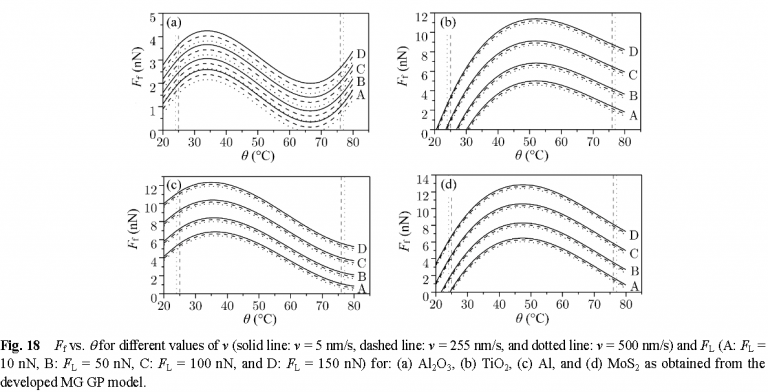
A recent systematic experimental characterisation of technological thin films, based on elaborated design of experiments as well as probe calibration and correction procedures, allowed for the first time the determination of nanoscale friction under the concurrent influence of several process parameters, comprising normal forces, sliding velocities, and temperature, thus providing an indication of the intricate correlations induced by their interactions and mutual effects. This created the preconditions to undertake in this work an effort to model friction in the nanometric domain with the goal of overcoming the limitations of currently available models in ascertaining the effects of the physicochemical processes and phenomena involved in nanoscale contacts. Due to the stochastic nature of nanoscale friction and the relatively sparse available experimental data, meta-modelling tools fail, however, at predicting the factual behaviour. Based on the acquired experimental data, data mining, incorporating various state-of-the-art machine learning (ML) numerical regression algorithms, is therefore used. The results of the numerical analyses are assessed on an unseen test dataset via a comparative statistical validation. It is therefore shown that the black box ML methods provide effective predictions of the studied correlations with rather good accuracy levels, but the intrinsic nature of such algorithms prevents their usage in most practical applications. Genetic programming-based artificial intelligence (AI) methods are consequently finally used. Despite the marked complexity of the analysed phenomena and the inherent dispersion of the measurements, the developed AI-based symbolic regression models allow attaining an excellent predictive performance with the respective prediction accuracy, depending on the sample type, between 72% and 91%, allowing also to attain an extremely simple functional description of the multidimensional dependence of nanoscale friction on the studied variable process parameters. An effective tool for nanoscale friction prediction, adaptive control purposes, and further scientific and technological nanotribological analyses is thus obtained.